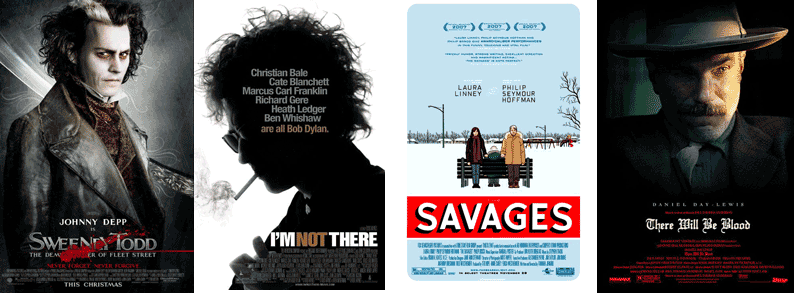| “Smart People”-The problem with “Smart People” is that it’s about unhappy people and it’s hard to make a comedy about such characters. Dennis Quaid plays Lawrence Wetherhold, a tenured professor of English in Pittsburgh who is a miserable grouch who has never gotten over the death of his wife, and takes it out on the world in general, including his students. He lives with his brilliant but miserable teenage daughter Vanessa, played by Ellen Page (doing a fine job but who needs to break out of these snippy smart-mouthed teenager roles before she is fatally typecast). There is also the little-seen student son James (Ashton Holmes) of whom Lawrence seems almost oblivious, especially with regard to his burgeoning talents as a writer. Into this family situation comes Chuck (the appealing Thomas Haden Church), Lawrence’s disliked brother-by-adoption, who initially seems hopeless but eventually shows more maturity than his brother by, among other things, encouraging Vanessa, a stiff-lipped Young Republican, to have some fun. Finally, there is Dr. Janet Hartigan (Sarah Jessica Parker), an attractive doctor who takes a difficult to fathom interest in Lawrence, her former English professor, despite his serious flaws and her own romantic difficulties. Dennis Quaid overdoes the grouch early on to such an extent that the film feels uncomfortable, and even at the end it’s apparent that he hasn’t quite had a sufficient metamorphosis despite the expected upbeat ending (which occurs mostly behind the closing titles). C+ (8/31/08) “Protagonist”-This documentary concerns four men who seemingly have little in common, but it’s ultimately demonstrated that their adult lives were shaped to some extent by traumatic events in their youth. The filmmaker, Jessica Yu, uses her husband, the writer Mark Salzman, who tells of growing up in Connecticut as a kid who was frequently picked on by others, and who found inspiration in David Carradine’s TV Kung Fu portrayal. Salzman eventually decided to learn martial arts but chose a jerky and abusive teacher and then rejected it when he matured into the Chinese scholar and writer he became. Unfortunately, Salzman’s story, though well told, was the least compelling of the four in terms of the theme. The others are Mark Pierpont, a gay man who found himself as the “black sheep” of his family as a youth and then tried to reject his homosexuality by turning himself into a fanatic evangelical preacher; Joe Loya, a Mexican-American who, having been beaten by an abusive father in LA, emulated him by abusing others physically and mentally as a bank robber, before an epiphany turned him into a commentator/writer using his intellect; and Hans-Joachim Klein, whose mother died in a concentration camp although his father was a Nazi sympathizer, and became a young German terrorist in league with Carlos the Jackal, ultimately being involved in several deaths in a 1975 attack on OPEC officials in Vienna before realizing that what he was doing was useless and absurd. The film's use of puppetry and Greek philosophy to offset the four stories unfortunately seemed more amateurish than impressive. In addition, the editing seemed questionable as the film jumped much too abruptly back and forth between the various protagonists and their stories, thus losing its punch. Ultimately, “Protagonist” was too contrived to be really effective. (Partly in German with English subtitles). C (8/30/08) “Stop-Loss”-Kimberly Peirce (“Boys Don’t Cry”) directed this interesting anti-war, anti-Bush film about a group of Texas soldiers who are traumatized in Iraq by the death and destruction they witness, and then have to face their families, girlfriends, and wives. Ryan Phillippe is effective as Sgt. Brandon King, the leader of the group, but also the one who goes AWOL in anger and frustration when told, on the day that he thinks he’s getting out of the military, that he’s been “stop-lossed” and must return to Iraq. Although the pain of some of his comrades, including Tommy Burgess (Joseph Gordon-Levitt) and Steve Shriver (Channing Tatum) is revealed, it’s Brandon King who runs off, accompanied by the beautiful and tough Michelle (Abbie Cornish), who had been Steve Shriver’s girlfriend, on a hopeless journey to see a US Senator he thinks could help him. “Stop-Loss” effectively demonstrates the trauma and pain that American soldiers have experienced since the beginning of the Iraq war, made even worse for those who, as a result of small-print in their military service contracts, find that they have to return over and over to the dangers of Iraq. Abbie Cornish, who is Australian, plays the tough, gritty Texan, Michelle, to perfection. Also of note in the cast is Victor Rasuk (“Bonneville”) as the severely injured but still upbeat Pvt. Rico Rodriguez. B+ (8/29/08) | |









